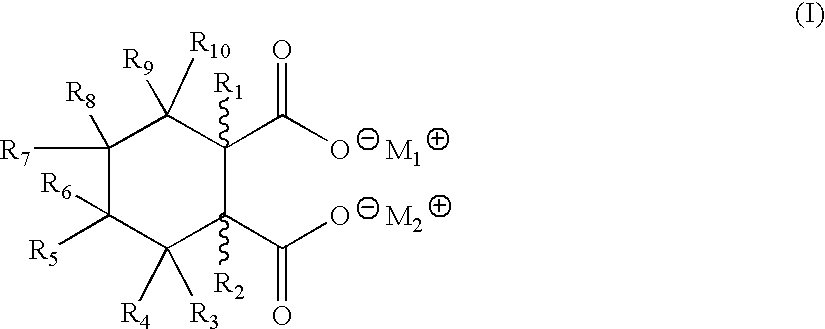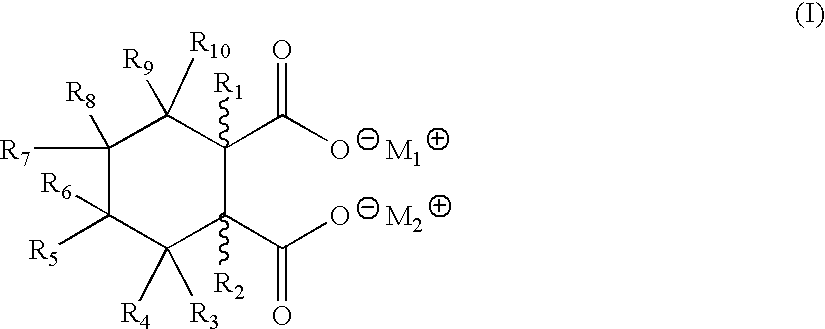Metal salts of hexahydrophthalic acid as nucleating additives for crystalline thermoplastics
a technology of hexahydrophthalic acid and metal salts, which is applied in the preparation of carboxylic compounds, organic chemistry, group 3/13 element organic compounds, etc., can solve the problems of high unexpected and unpredictable properties, combined with other attributes, and achieve excellent calcium stearate compatibility, excellent high peak crystallization temperatures, and low hygroscopicity.
- Summary
- Abstract
- Description
- Claims
- Application Information
AI Technical Summary
Benefits of technology
Problems solved by technology
Method used
Image
Examples
example 2
Cis-Strontium HHPA:
To an 500-mL round bottom flask with a mechanical stirrer and reflux condenser was added cis-hexahydrophthalic anhydride (15.4 g, 100 mmol), water (200 mL), and sodium hydroxide (16 g, 400 mmol) and the mixture heated to 50.degree. C. After stirring with heat for 2 hours, a solution of strontium chloride hexahydrate (26.7 g, 168 mmol) was added and a white flocculate appeared immediately. The white product was collected by suction filtration, washed with copious amounts of water, and dried in a vacuum oven overnight at 110.degree. C. The dry weight was 25 grams (97% yield) with a melting point in excess of about 400.degree. C. The IR and NMR spectra were consistent with the expected product.
example 3
Cis-Dilithium HHPA
To a 1-L 3-necked round bottom flask fitted with a reflux condenser, mechanical stirrer, and thermometer was added water (300 mL), lithium hydroxide monohydrate (17.7 g, 421 mmol), and cis-hexahydrophthalic anhydride (30.8 g, 200 mmol). After heating at reflux for 3 hours, the reaction mixture was cooled and then poured into acetone (500 mL). No precipitate formed, and the solvents were removed by rotary evaporation to give a white powder. The powder was washed on a filter with 50 mL of cold water, and the solid was dried in a vacuum oven at 85.degree. C. overnight. The dry weight as about 37 grams (100%), with a melting point greater than about 350.degree. C. IR and NMR analysis were consistent with that of the expected product.
example 4
Cis-Monobasic Aluminum HHPA
To a 500-mL round bottom flask with a mechanical stirrer was added cis-disodium HHPA (10 g, 46.2 mmol) and water (100 mL). When homogeneity was obtained, a solution of aluminum sulfate (15.4 g, 23 mmol) in water (100 mL) was added, at which time a white flocculate formed immediately. After stirring at 50.degree. C. for 30 minutes, the pH was adjusted to 9, the white solid was collected via suction filtration, washed with water (200 mL), and dried in a vacuum oven overnight at 100.degree. C. The dry weight equaled 8.7 grams (88%) with a melting point of greater than about 400.degree. C. IR and NMR analysis were consistent with that of the expected structure.
PUM
| Property | Measurement | Unit |
|---|---|---|
| melting point | aaaaa | aaaaa |
| melting point | aaaaa | aaaaa |
| melting point | aaaaa | aaaaa |
Abstract
Description
Claims
Application Information
 Login to View More
Login to View More - R&D
- Intellectual Property
- Life Sciences
- Materials
- Tech Scout
- Unparalleled Data Quality
- Higher Quality Content
- 60% Fewer Hallucinations
Browse by: Latest US Patents, China's latest patents, Technical Efficacy Thesaurus, Application Domain, Technology Topic, Popular Technical Reports.
© 2025 PatSnap. All rights reserved.Legal|Privacy policy|Modern Slavery Act Transparency Statement|Sitemap|About US| Contact US: help@patsnap.com


